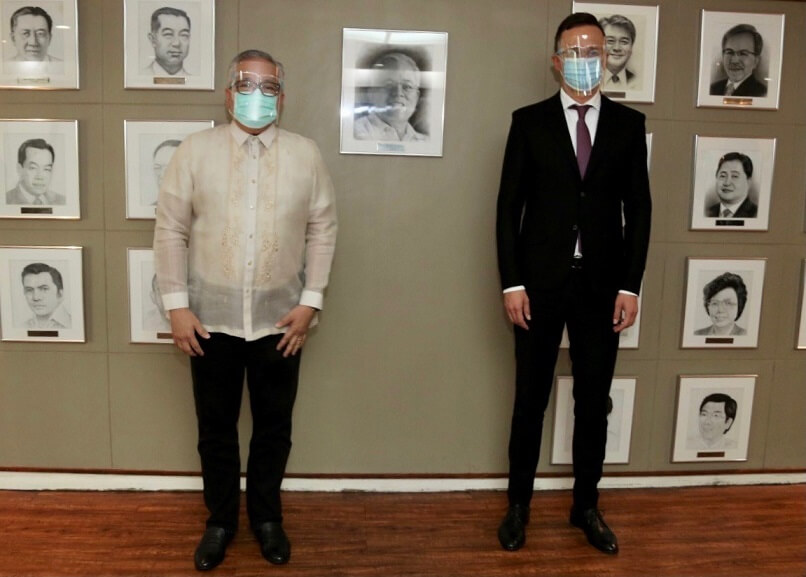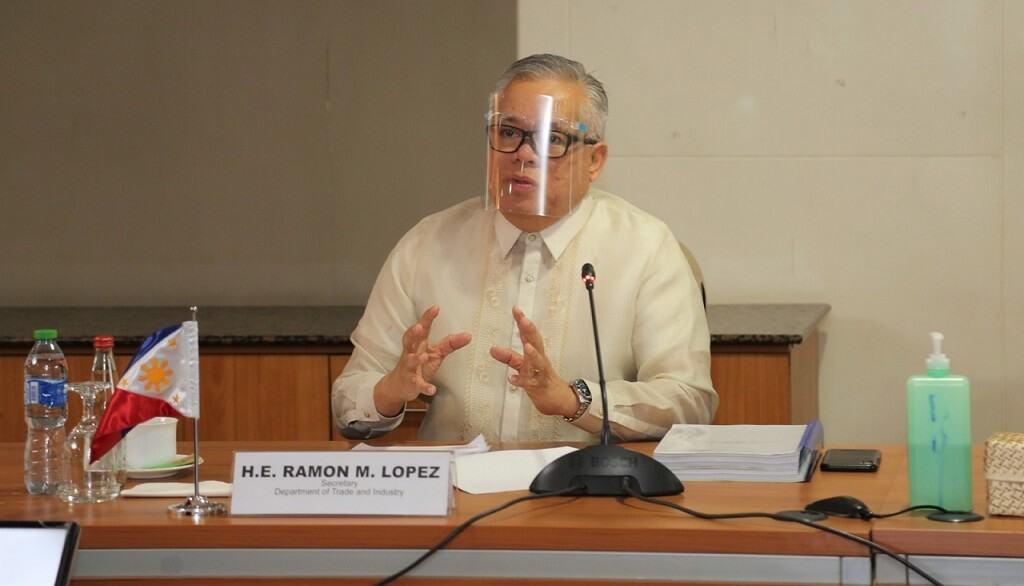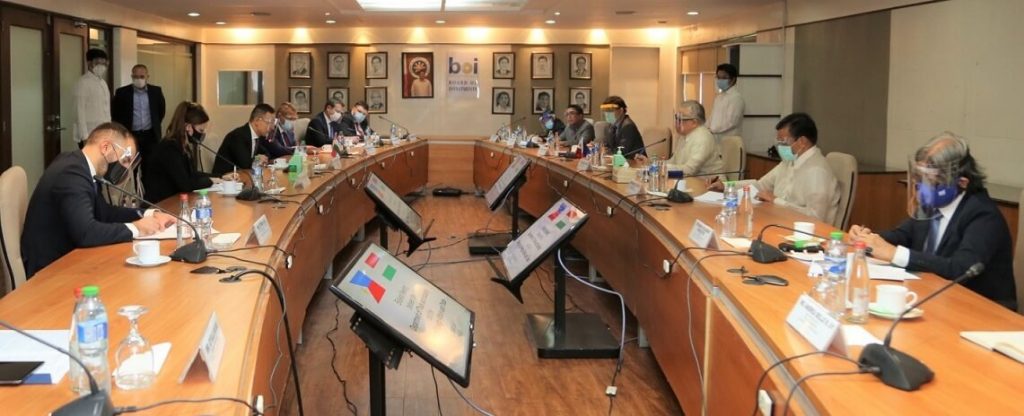
MANILA – The Department of Trade and Industry (DTI) held a high-level bilateral meeting with Hungary on 15 October 2020 in Makati. The meeting was led by Secretary Ramon Lopez and His Excellency Péter Szijjártó, Minister of Foreign Affairs and Trade of Hungary. This is the first bilateral face-to-face ministerial meeting of the DTI with a trading partner since the onset of the COVID-19 pandemic.
The meeting is the fourth high-level exchange that has taken place between the DTI and the Hungarian Ministry of Foreign Affairs and Trade (MFAT) since the reopening of the Embassy of Hungary in Manila in March 2017. This is also the second time Minister Szijjártó visited Secretary Lopez in Manila. The Minister first visited in 2017 when he and Secretary Lopez signed the Agreement on Economic Cooperation which established the Philippines-Hungary Joint Commission on Economic Cooperation.
“The presence of Minister Szijjártó amidst this pandemic shows the importance of the country for Hungary both as a trading partner and as an investment destination,” said Secretary Lopez.
In the meeting, the officials discussed the developments of the country’s GSP+ beneficiary status and noted PH’s comprehensive response on the GSP+ dialogue process last month.
Noting the unilateral and temporary nature of GSP+, Secretary Lopez also highlighted the importance of building on the first two rounds of FTA talks between the Philippines and the EU. Minister Szijjártó assured the Philippines that Hungary supports the continuation of the PH-EU FTA negotiations. Citing his personal experience of the Philippines, Minister Szijjártó urged the European Union to continue the negotiations, highlighting that an FTA creates better opportunities and a freer environment for Hungarian companies to do business with the Philippines.

“Part of the DTI’s strategy to enhance our outbound trade and inbound investment with the EU is to increase our engagement with individual EU member states. Hungary has been one of our key allies in the EU in supporting our status as a GSP+ beneficiary and our FTA negotiations with the EU. It really shows that there is untapped potential for greater trade and investments that could only be realized through an FTA. Their visit to the Philippines despite the challenges presented by the pandemic is a testament to our strong bilateral relationship,” Secretary Lopez said.
Hungary ranked 9th in the 2018 Economic Complexity Index (ECI), which measures a country’s productive knowledge by assessing the complexity and diversity of the products it exports.
In 2019, total Philippine exports to the EU amounted to EUR 7.6 billion, of which EUR 197 million went to the Hungarian market. Out of this amount, EUR 8 million worth of Philippine products that entered the Hungarian market were exported through EU-GSP+.
Philippines-Hungary Joint Commission on Economic Cooperation (JCEC)

One of the key outcomes of the meeting is the confirmation of the dates of the 2nd meeting of the Philippines-Hungary Joint Committee on Economic Cooperation (PH-HU JCEC). As a move towards the new normal, both sides are looking to safely conduct the said meeting before the end of the year.
The discussions covered the agenda of the JCEC, which also includes COVID-19 cooperation. Undersecretary Rodolfo said, “Since we are positioning the country as a PPE-manufacturing hub, the implementation of the memorandum of understanding (MOU) between the DTI-Philippine International Trading Corporation (PITC) and the Hungarian Export Promotion Agency (HEPA) and the MOU on investment cooperation between the Board of Investments and the Hungarian Investment Promotion Agency (HIPA), which we signed last year, will be useful in our fight against COVID-19 and in building back better. We are looking forward in discussing this further when we convene the JCEC.”
The DTI also welcomed the signing of the new agreement on the Stipendium Hungaricum, a scholarship program for Filipinos who would like to pursue post-graduate studies in Hungary. The agreement was signed by DFA Secretary Teodoro Locsin and Minister Szijjártó during their bilateral meeting yesterday morning.
Other areas that are expected to be discussed in the JCEC include manufacturing, water treatment and management, agriculture and food economy, food safety, health, and transportation.
The JCEC is part of the DTI’s thrust to enhance bilateral trade and investment relations with non-traditional markets.
PH to tap Hungarian expertise on water treatment and management
Another key highlight of the meeting is the discussion on water treatment and management cooperation. The Philippines is in talks to tap Hungarian technology to better harness its water resources and to rehabilitate key bodies of water, such as Laguna de Bay. Secretary Lopez welcomed the developments on water cooperation, saying that he has been closely monitoring this initiative since it was first discussed in the inaugural JCEC meeting last year.
Key projects include the commissioning of the mobile water treatment equipment donated to the National Disaster Risk Reduction and Management Council to ensure safe drinking water in times of disaster, the conduct of a feasibility study to rehabilitate Laguna Lake, and the deployment of monitoring stations in Laguna Lake to trace and identify sources of pollution. The projects will be supported by a tied-aid program extended to the Philippines. It will also support other water treatment and management projects proposed by other Philippine water management agencies.
Undersecretary Rodolfo added, “The Philippines and Hungary face the same challenge in terms of access to clean water resources. From their part, they were able to develop the technology to treat one of the longest rivers in Europe, the Danube. This water cooperation is just the first step. We want to tap their expertise to facilitate technology and knowledge transfer and build confidence so that these Hungarian water companies will invest here in the Philippines. Hungary is looking to expand their foreign market presence in this field and we want them to use the Philippines as their base. They have the technology, while we have the resources and the geography. We need to harness this complementation.”
COVID-19 response
Both sides likewise tackled the challenges, opportunities, and the impact of COVID-19 to their economies. The DTI welcomed Hungary’s willingness to cooperate with the Philippines to fight COVID-19. There were fruitful exchanges on policies and initiatives in fighting the pandemic. Notable similarities include enabling repurpose manufacturing of critical products and providing relief and support for micro, small and medium enterprises. On repurposing, Secretary Lopez highlighted the public-private sector cooperation on PPE manufacturing, which became the PPE Manufacturing Ecosystem Development initiative. ♦
Date of Release: 27 October 2020


